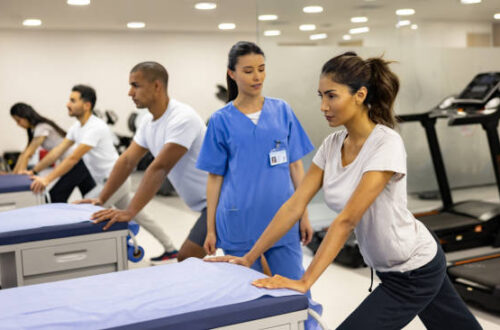Exams. The word alone can make you feel a little stressed, right? You’re probably thinking about late-night study sessions, stacks of textbooks, and the pressure to do well. And in all of that, what’s the first thing to get pushed to the side? Your health and fitness.
It’s easy to think, “I don’t have time for a workout” or “I’ll just grab a sugary snack to keep me going.” But here’s a secret: taking care of your body is one of the best things you can do for your brain during this tough period. Being fit isn’t just about looking good; it’s about feeling good, having more energy, and even thinking more clearly.
This guide is for all of you students out there who want to ace your exams without burning out. We’re going to talk about simple, easy-to-follow fitness tips that won’t take up a lot of your precious study time. So, let’s get into it!
Why Fitness is a Game-Changer for Your Exams Grades
Contents
- 1 Why Fitness is a Game-Changer for Your Exams Grades
- 2 Easy Ways to Stay Active Without Sacrificing Study Time of Exams
- 3 What to Eat: Fueling Your Brain for Success
- 4 Don’t Forget About Sleep and Mental Health
- 5 Creating Your Own Exam Season Fitness Plan
- 6 FAQs: Your Quick Questions Answered
- 7 Final Thoughts: Taking Care of Yourself is the Smartest Strategy
You might be wondering, “How does a jog help me remember my history notes?” It’s a great question, and the answer is super interesting. When you exercise, a few amazing things happen inside your body and brain.
First, exercise helps reduce stress. Exams are a major source of stress, and when you’re stressed, your body releases a hormone called cortisol. High levels of cortisol can make it hard to focus, cause anxiety, and even mess with your memory. A quick workout, even just a 15-minute walk, helps lower cortisol and releases “feel-good” hormones called endorphins. These make you feel happier and more relaxed, which is exactly what you need when you’re facing a tough exam.
Second, physical activity improves your blood flow. More blood flow means more oxygen and nutrients get to your brain. This can boost your brain function, improve your concentration, and help you think more clearly. Think of it like giving your brain a little turbo boost. A well-oxygenated brain is a smart brain!
Finally, fitness can help you sleep better. We all know how important a good night’s sleep is, especially before a big exam. But sometimes, it’s hard to switch off your brain after a day of intense studying. Regular exercise, especially earlier in the day, can help regulate your sleep cycle. You’ll fall asleep faster and get the deep, restorative sleep your brain needs to lock in all that new information.
See? It’s all connected. Taking care of your body is a way of taking care of your brain. So, now that you’re convinced, let’s look at some practical tips.
Easy Ways to Stay Active Without Sacrificing Study Time of Exams
You don’t need to spend two hours at the gym every day to see the benefits of exercise. Small, smart changes can make a huge difference. The key is to find what works for you and your schedule.
Tip 1: The “Study Break” Workout
Instead of scrolling through social media during your study breaks, try a quick workout. A study break shouldn’t just be about resting your eyes; it should be about moving your body. A good rule of thumb is to take a 10-15 minute break for every 50 minutes of studying.
What can you do in 15 minutes? A lot!
- Walk it out: Put on some music or a podcast and take a brisk walk around the block. The fresh air and movement will wake you up.
- Stair challenge: If you have stairs, walk up and down them a few times. It’s a great way to get your heart rate up quickly.
- Quick bodyweight circuit: Do a few rounds of exercises like squats, lunges, push-ups (even against a wall), and jumping jacks. No equipment needed!
This kind of break is a triple win: it gives your brain a rest, gets your body moving, and helps you feel more energized when you get back to your books.
Tip 2: Make Your Commute Count
Do you live close enough to campus or a library to walk or bike? If so, this is a golden opportunity to squeeze in some exercise. Walking or cycling to your study spot is a fantastic way to start the day. It gets your blood flowing and helps you clear your head before you even open a book.
If you take public transport, you can still make it work. Get off a stop or two earlier and walk the rest of the way. Every little bit of movement adds up!
Tip 3: Desk-Based Stretches and Exercises
Sometimes, you just can’t get away from your desk. That’s okay! You can still do some simple exercises right where you are. These movements can help prevent the aches and pains that come from sitting for long periods.
- Neck stretches: Gently tilt your head from side to side, and roll your shoulders back and forth.
- Leg lifts: While sitting, straighten one leg at a time and hold it for a few seconds. This helps strengthen your core and legs.
- Wrist and hand stretches: Important for preventing wrist strain from all that writing and typing. Clench and release your fists, and stretch your fingers.
These small actions can help improve your posture and prevent stiffness, making you more comfortable and focused during your study sessions.
Tip 4: Find a Study Buddy Who is Also a Workout Buddy
Everything is more fun with a friend, right? Find a friend who is also preparing for exams and agree to take a walk or go for a run together. This adds a social element to your fitness routine, which can be a great stress-reliever. Plus, you’ll be more likely to stick with your plan if you have someone holding you accountable. You can talk about your studies while you’re moving, which makes the time even more productive.
Tip 5: Don’t Underestimate the Power of a Good Stretch
After a long day of sitting and studying, your muscles can feel tight and your posture can suffer. A good stretching routine, even just for 5-10 minutes before bed, can help. Focus on stretching your back, shoulders, hamstrings, and neck. This can help with muscle soreness, improve flexibility, and even help you relax before you go to sleep.
Tip 6: Use Technology to Your Advantage
Your phone can be a distraction, but it can also be a powerful tool for staying fit. There are countless free apps that offer quick, guided workouts that you can do anywhere, anytime. You can also use a timer to remind you to take a break every hour or so. Consider using a fitness tracker to count your steps. Aiming for a step goal can be a fun and motivating way to make sure you’re moving enough.
What to Eat: Fueling Your Brain for Success
Fitness isn’t just about exercise; it’s also about what you put into your body. Your brain needs the right fuel to perform at its best. During exams, it’s tempting to reach for junk food, energy drinks, and sugary snacks. But these things can cause your energy levels to spike and then crash, which is the last thing you want when you’re trying to focus.
Healthy Eating Habits During Exam Season
- Stay hydrated: Drink plenty of water throughout the day. Dehydration can lead to fatigue and poor concentration. Keep a water bottle on your desk at all times.
- Eat regular meals: Don’t skip meals. Your brain needs a steady supply of energy. Focus on balanced meals with lean protein, whole grains, and lots of fruits and vegetables.
- Smart snacking: Instead of chips or candy, reach for brain-boosting snacks like nuts, seeds, yogurt, or an apple. These snacks provide sustained energy and essential nutrients.
- Limit caffeine and sugar: A little bit of coffee can be helpful, but too much can make you jittery and anxious. Try to avoid sugary energy drinks, which can lead to a big energy crash later on.
By fueling your body with the right foods, you’re giving your brain the best chance to succeed.
The Best Brain Foods for Students
Let’s dive a little deeper into what makes a food “brain-boosting.”
- Berries: Blueberries, strawberries, and other berries are packed with antioxidants that help protect your brain from damage and improve memory.
- Fatty Fish: Salmon, mackerel, and sardines are rich in Omega-3 fatty acids. These are crucial for brain function and can help improve memory and mood.
- Nuts and Seeds: Walnuts, almonds, and pumpkin seeds are great sources of Vitamin E and healthy fats, which are important for cognitive function.
- Leafy Greens: Spinach, kale, and other leafy greens are full of vitamins and minerals that can slow down age-related cognitive decline.
- Whole Grains: Brown rice, oats, and whole-wheat bread provide a slow, steady release of glucose into your bloodstream. This is your brain’s main energy source and helps you stay focused for longer periods.
Making these small changes to your diet can have a huge impact on your ability to study effectively and perform well on your exams.
Don’t Forget About Sleep and Mental Health
Exams are a marathon, not a sprint. You need to take care of your mental health and emotional well-being just as much as your physical health.
The Power of a Good Night’s Sleep
It’s a cliché for a reason: sleep is incredibly important. You might think pulling an all-nighter is a good idea, but it’s not. Your brain uses sleep to organize and store all the information you’ve learned during the day. Without enough sleep, that information is much harder to recall. Aim for 7-9 hours of sleep per night, if you can.
Here are some tips for better sleep:
- Create a bedtime routine: This could be reading a book, listening to calm music, or stretching.
- Avoid screens: The blue light from your phone, laptop, and tablet can mess with your body’s natural sleep signals. Try to put them away at least an hour before bed.
- Make your room a haven: Keep your room dark, quiet, and at a comfortable temperature.
Simple Stress-Busting Techniques
- Mindfulness and deep breathing: Take a few minutes to sit quietly, close your eyes, and focus on your breath. Inhale slowly, hold for a few seconds, and exhale slowly. This can calm your nervous system.
- Journaling: Writing down your thoughts and worries can help you get them out of your head and onto paper.
- Listen to music: Put on some of your favorite tunes to lift your mood and give yourself a break.
- Talk to someone: Don’t keep your stress bottled up. Talk to a friend, a family member, or a school counselor. Sharing your feelings can be a massive relief. Remember, it’s a completely normal feeling to feel overwhelmed during this time.
Creating Your Own Exam Season Fitness Plan
You’ve got the tips, now it’s time to put them into action. Here’s how you can create a simple, effective plan for yourself.
Step 1: Be Realistic. Don’t try to go from zero to one hundred. You’re not training for a marathon. Start with something simple, like a 15-minute walk every day. You can always add more later if you feel up to it.
Step 2: Schedule It. Just like you schedule your study sessions, schedule your physical activity. Treat it as an important appointment. Put it in your planner or set a reminder on your phone.
Step 3: Track Your Progress. This isn’t about counting calories or reps. It’s about feeling better. Pay attention to how you feel after a walk or a quick workout. Do you feel more focused? More relaxed? Noting these positive changes will motivate you to keep going.
Step 4: Be Flexible. Life happens. Some days you might be too tired or busy. That’s okay. Don’t beat yourself up. Just get back on track the next day. The goal is consistency, not perfection.
FAQs: Your Quick Questions Answered
Q1: How much exercise do I really need to do?
A: Even a little bit helps! Aim for at least 15-20 minutes of physical activity most days. This could be a brisk walk, some stretching, or a quick bodyweight workout. The key is to get your heart rate up a little and move your body.
Q2: Is it okay to work out late at night?
A: It’s generally better to exercise earlier in the day, especially if it’s a high-intensity workout. Working out too close to bedtime can make it harder to fall asleep. If you do work out at night, stick to something gentle like stretching or a short, slow walk.
Q3: What about sports? Should I give them up during exams?
A: Not at all! If you’re on a sports team, the physical activity and social interaction can be a great way to relieve stress. Just make sure you’re balancing it with your study time and not overdoing it. A good coach will understand that your studies are a priority during exam season.
Q4: Can a healthy diet really improve my memory?
A: Yes! A diet rich in nutrients, especially things like omega-3 fatty acids (found in fish and nuts) and antioxidants (found in fruits and vegetables), is essential for brain health. A well-fueled brain is a well-performing brain.
Q5: I’m really stressed and have no motivation. What’s the first step I should take?
A: Start with something tiny. Don’t think about a big workout. Just stand up, stretch your arms over your head, and take a few deep breaths. Then, go and get a glass of water. A tiny first step can often lead to a second, and a third. The goal is to build a little momentum.
Q6: How can I avoid the “all-nighter” temptation?
A: The best way to avoid all-nighters is to plan your study schedule ahead of time. Break down your material into smaller, manageable chunks. This makes the workload feel less overwhelming. If you feel like you’re falling behind, try to get up a little earlier instead of staying up late. A rested brain will absorb more information than a tired one.
Q7: What if I don’t have time for a full meal?
A: Even if you’re in a rush, don’t skip eating. Grab a quick, healthy snack like a handful of nuts, a banana, or a yogurt cup. These will give you the energy you need to keep going without causing a sugar crash. Preparing some of these snacks in advance can be a lifesaver.
Final Thoughts: Taking Care of Yourself is the Smartest Strategy
Exams are a test of your knowledge, but they’re also a test of your endurance. By prioritizing your physical and mental well-being, you’re not just surviving exam season—you’re setting yourself up to thrive.
Remember, your body and mind are a team. When you take care of one, you’re helping the other. So, take those breaks, go for that walk, eat something healthy, and get some rest. You’ll not only do better on your exams, but you’ll also feel better throughout the whole process. Good luck, you’ve got this!





